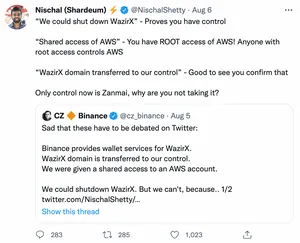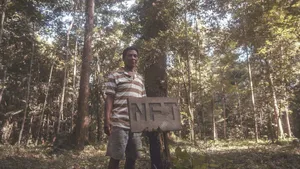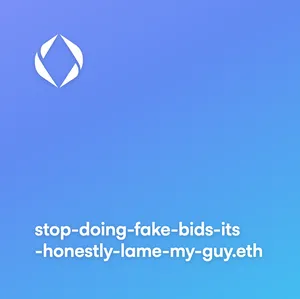Despite a 2019 blog post by Binance titled, "Binance Acquires India's Leading Digital Asset Platform WazirX to Launch Multiple Fiat-to-Crypto Gateways", Binance CEO Changpeng Zhao ("CZ") tweeted that "Binance does not own any equity in Zanmai Labs, the entity operating WazirX", and that besides wallet services and an off-chain transaction integration, "WazirX is responsible all other aspects of the WazirX exchange". These statements were disputed by Nischal Shetty, the founder of WazirX, who stated in no uncertain terms that WazirX was acquired by Binance. "Binance owns WazirX domain name. Binance has root access of AWS servers. Binance has all the Crypto assets. Binance has all the Crypto profits", Shetty wrote on Twitter.
No one wants to admit to owning the WazirX crypto exchange
Brand new Dragoma "move-to-earn" game rug pulls for around $3.5 million
The project launched only days before it rug pulled. On August 7, the $DMA token dropped in price over 99% as funds were removed from the project and moved to exchanges. According to CoinDesk, around $3.5 million was taken. The project's website, Telegram channel, and Twitter accounts were all taken offline.
Someone makes NFTs out of photographs from the Xinjiang Victims Database
Someone apparently decided this was perfect material for an NFT project, which they named "Made In Uyghur". They took 100 images from the database, clumsily projected them onto 3D-rendered human models in a T-pose, and listed them for $25 apiece.
Upon becoming aware of the NFTs, the Xinjiang Victims Database updated their site licensing to CC BY-NC, a Creative Commons license that forbids commercial reuse. "Commercial use of the data, including images of victims, is not okay", they wrote on Twitter, "[Made In Uyghur] never contacted us about this".
"Saxon James Musk" token developer rug pulls for around $442,000
The project developer suddenly sold off their share of the coin for around 1355 WBNB (~$442,000), sending the coin price plummeting by more than 68% as a result.
Beanstalk Farms comes back for round two after $182 million exploit
Now, Beanstalk is re-launching, saying they've made changes to their governance model and security practices, and have received audits from two major firms.
In June, the project creator stated that "The thing about a system like Beanstalk is that it works until it doesn't. You can never actually know if it works, only that it has worked so far."
Hacker compromises wallet of Steven Galanis, CEO of Cameo app, stealing $231,000
Galanis wrote on Twitter that he "Just got my Apple ID hacked". Although he didn't offer more details on how he had determined iCloud was to blame, it's likely he's referring to an attack vector where MetaMask automatically backs up users' seed phrases to iCloud unless it's disabled, meaning that a hacker who successfully accesses a person's iCloud account can also compromise any of their MetaMask wallets. The same type of attack saw a user lose $650,000 in April, and brought wider attention to the app's behavior.
Researchers identify an attack strategy actively being used by the second-largest Ethereum mining pool to earn outsized mining rewards
By manipulating the timestamps of blocks to be added to the chain, a miner can replace other miners' main-chain blocks with their own blocks, obtaining the fees that would have gone to the other miners. The attack has been called an "Uncle Maker" attack because Ethereum refers to valid but not main-chain blocks as "uncles".
F2Pool co-founder Chun Wang responded on August 8 to the allegations against his mining pool, apparently acknowledging their behavior and suggesting that manipulating a vulnerability in a system is not a "blatant disregard [of] the rules" as the researchers had characterized it. He tweeted: "We respect the *consensus* as is. If you don't like the consensus, convince [Ethereum developer Tim Beiko] to send me another Announcement and change it." Quote-tweeting a tweet by the lead author of the paper who described F2Pool's technique, he wrote, "I can't stop appreciate this elegant implementation of what we've done over the past two years... A robust system must withstand all kind of tests."
India freezes assets of WazirX, Binance's Indian exchange
The ED wrote in a press release, " ED found that large amounts of funds were diverted by the fintech companies to purchase crypto assets and then launder them abroad...(a) maximum amount of funds were diverted to WazirX exchange and the crypto assets so purchases have been diverted to unknown foreign wallets".
Ian Macalinao revealed to have pumped the total value locked on the Solana ecosystem by pretending to be 11 developers working on over a dozen projects
In an unpublished blog post where he confessed to his deception, he wrote, "I believe it contributed to the dramatic rise of SOL". He wrote the post shortly after one of his persona's projects, Cashio, was hacked for $52 million, but apparently shelved it.
Ian Macalinao's brother Dylan, the other co-founder of Saber protocol, aided in the scheme by lending credibility to Ian's various personas to those who had doubts about trusting money to projects led by pseudonymous individuals.
All told, Ian Macalinao was responsible for the Saber protocol, the Protagonist VC firm and incubator, and Ubeswap under his real name. He created Sunny Aggregator as Surya Khosla, Cashio as 0xGhostchain, Goki as Goki Rajesh, Quarry as Larry Jarry, TribecaDAO as Swaglioni, Crate as kiwipepper, aSOL as 0xAurelion, Arrow as oliver_code, Traction.Market as 0xIsaacNewton, Sencha as jjmatcha, and VenkoApp as ayyakovenko.
CoinGape and Binance publicize scam recovery address after Nomad hack
However, that was not the address that CoinGape published in their article titled "Breaking: Nomad Announces ENS Address And Bounty For Returning Funds" article, which was syndicated to Binance's news feed. Instead, they indicated that people should send funds to a different address, a scammer who had been sending on-chain messages to various people who took money out of Nomad during the exploit, asking they return it.
Although CoinGape removed the article fairly quickly, it remained live on Binance's site for over an hour. Fortunately, it doesn't appear anyone besides the writers have fallen for the scam, as no cryptocurrency has been sent to the address.
ZB crypto exchange exploited for more than $3.5 million
ZB announced that they were suspending deposit and withdrawal services due to "sudden failure of some core applications".
Robinhood cites crypto market crash in decision to lay off 23% of employees
Robinhood CEO Vlad Tenev wrote, "Since that time, we have seen additional deterioration of the macro environment, with inflation at 40-year highs accompanied by a broad crypto market crash. This has further reduced customer trading activity and assets under custody. Last year, we staffed many of our operations functions under the assumption that the heightened retail engagement we had been seeing with the stock and crypto markets in the COVID era would persist into 2022."
The announcement came the same day that Robinhood was fined $30 million by the state of New York for insufficient anti-money laundering and cybersecurity protections in the crypto portions of their offering.
Thousands of Solana wallets drained in attack that nets over $6 million
CoinShares investment firm reports $21.5 million loss from Terra collapse
- "CoinShares reports $21.7M loss tied to Terra implosion", Cointelegraph
Michael Saylor steps down as MicroStrategy CEO as the company reports a $918 million impairment charge on Bitcoin holdings
Unfortunately, that treasury strategy — which in his case also includes taking on more debt to buy more Bitcoin — is not currently working out so well for MicroStrategy, which reported a $918 million impairment charge on their Bitcoin holdings in their most recent earnings report. Saylor stepped down as CEO the same day.
Robinhood fined $30 million over lackluster cybersecurity and anti-money laundering protections in their crypto offering
Robinhood Crypto had certified to the DFS in 2019 that they were in compliance with those regulations, despite the fact that they were not. The DFS imposed a $30 million fine to the company, and also ordered them to hire an outside party to evaluate their regulatory compliance and efforts to remediate the problems with their platform.
Reaper Farm exploited for around $1.7 million
Shortly after the exploit, Reaper Farms announced they plained to raise capital via "the sale of vested $OATH tokens from our treasury with desirable terms", which would then be used alongside other assets in their treasury to compensate users.
- "Multi-Strategy Vault Post-Mortem", Reaper Farm
- "8/1/2022 Reaper.Farm Exploit Recovery Plan", Reaper Farm
Operators of Dropil crypto scam sentenced to federal prison
- "Two Orange County Men Sentenced to Federal Prison for Conning Investors Out of $1.9 Million Through Cryptocurrency Offering", U.S. Attorney's Office, Central District of California
SEC charges perpetrators of $300 million Forsage crypto pyramid scheme
Users deposited their money into projects running on the Ethereum, Tron, and Binance blockchains, and earned rewards for recruiting others to the scheme. The project also used payments from newer investors to pay out earlier investors — a Ponzi scheme.
- "SEC Charges Eleven Individuals in $300 Million Crypto Pyramid Scheme", U.S. Securities and Exchange Commission
- "SEC charges 11 people in alleged $300 million crypto Ponzi scheme", CNBC
Players in the National Women's Soccer League may be "out money" after Voyager bankruptcy
Those players have certainly learned something about crypto, as the league informed them that they're not likely to get the funds they were promised after Voyager Digital filed for bankruptcy in early July.
People rush to steal some of the $190 million in the Nomad bridge after an exploit is discovered
Nomad posted on Discord and tweeted that they were "aware of the incident" and "investigating", but the attack was ongoing over an hour after the acknowledgement.
Four days before the attack, Nomad announced that they'd raised a $22.4 million seed round from investors including Coinbase, OpenSea, and Crypto.com.
CoinFLEX cuts "significant number" of staff
- "CoinFLEX Update: July 29, 2022", CoinFLEX blog
Restructuring plans reveal Babel Finance's $225 million losses during crypto market dip
Helium caught lying that Lime and Salesforce use their network
Helium is a common name that comes up when people are pressed to provide examples of web3 use cases. The New York Times ran a feature on the company in February 2022, titled "Maybe There's a Use for Crypto After All", where Kevin Roose lavished praise on the company and wrote that they had "largely avoided the hype and inflated claims that surround many crypto projects" (oops) and repeated the false claim about a Lime partnership (double oops). Lime said that the Times never contacted them to fact-check the claim; meanwhile, Helium founder Amir Haleem prominently points people to the article with a pinned tweet.
However, a recent Twitter thread by Liron Shapira drew attention to the fact that the company's total monthly revenue from network usage is only $6,500 — raising questions about the feasibility of hotspot operators actually earning much in the way of rewards (as the rewards are distributed based on network usage).
Following the publication of Binder's article, Helium quietly removed Lime's logo from their website, along with that of Salesforce, a CRM software company. Salesforce also confirmed to The Verge that they had no partnership with Helium, and that the graphic on the Helium website where Salesforce's logo was displayed as a user of Helium was "not accurate".
Regulators order Voyager to stop saying they're FDIC insured
The Federal Reserve and the FDIC sent a cease-and-desist to Voyager, asking them to remove the misleading statements about deposit insurance. It would have been nice if this had come a bit earlier — perhaps before people had deposited money into accounts with the company and could no longer get it out.
Nirvana Finance drained of $3.5 million
The attack caused the project's ANA token to plunge in value by 80%, and the project's NIRV stablecoin to lose its dollar peg, falling to $0.08. Nirvana Finance tweeted, "Please be advised: ANA has lost its collateral, and NIRV has lost its peg. Until the thief restores funds, these tokens will not have exchange value. Be very careful with trading NIRV & ANA, as they currently have no guaranteed value."
They also tweeted at the hacker, promising to stop investigating the hacker's identity and to pay a $300,000 "bounty" in exchange for the funds back. They wrote, "You have not taken money from VCs or large funds — the treasury you have taken represents the collective hopes of everyday people."
The project had promised its users over 60% APY, and its Twitter account described ANA as "the balanced risk investment with adaptive yield".
No more Dune or DAO for the Dune DAO
The DAO has stumbled along somewhat since its January victory, encountering issues with making the bible viewable to DAO members without breaking copyright laws, a diminishing treasury due to declining crypto prices, and controversy after Soby was linked to the Remilia Collective.
After all that, the project leader suddenly and apparently unilaterally announced a plan where members could redeem their SPICE for ETH, and stated that they would be removing project leaders, converting the DAO to a private company, and selling the Dune bible (likely at a major loss). It was nice knowing you, SpiceDAO.
KuCoin announces "Anti-FUD Fund" to track down and sue critics
In his Twitter thread, Lyu outlines how the fund will "implement Anti-FUD education", "motivate and acclaim industry leaders and influencers who are always responsible, delivering trusted information", and "effectively trace FUDers who intentionally spread FUD and take legal actions against them if needed".
Something tells me his list of "industry leaders and influencers" to "acclaim" won't include those who are rightfully skeptical of crypto.
OFAC has been investigating Kraken over suspected sanctions violations
- "Kraken, a U.S. Crypto Exchange, Is Suspected of Violating Sanctions", The New York Times
CEO of Titanium Blockchain Infrastructure Services pleads guilty to securities fraud
Crypto platform Immutable lays off 17% of its gaming division staff
The fired employees quickly began preparing a legal fight against immutable, questioning whether their firing was legitimate when many of the people who were sacked were about to reach the vesting date for more than $1 million in stock options.
- "Australian crypto platform Immutable sacks 6% of staff despite plans to 'hire aggressively'", news.com.au
- "Sacked crypto unicorn staff plan legal challenge to redundancies", The Australian Financial Review
Brazilian authorities challenge NFT company Nemus after it claims ownership to land in the Amazon, allegedly pressures Indigenous people to sign documents they could not read
On July 20, they issued a press release claiming that "the World's First Non-Fungible Territory has been officially renamed by indigenous people in Brazil in coalition with Nemus". The company claims to own 41,000 hectares (~100,000 acres) of land in the Amazon.
On July 25, Brazil's Federal Prosecution Office (MPF) issued a statement that they had demanded Nemus provide proof of ownership of the areas they claim, clarification on the projects they've been promising online they would undertake, and proof that they've received authorization by the National Indian Foundation (FUNAI) or any other public body that would allow them to operate in the area and engage with various Indigenous groups.
According to the MPF, members of Indigenous groups in the area reported the company had violated their rights. They also explained that Nemus had expressed to them their plans to use heavy machinery to open an airstrip and build a road in order to access Brazil nut groves in the area. Apurinã leaders alleged that company representatives had pressured Indigenous people who do not read well to sign documents, and did not provide them with copies.
- "MPF aciona empresa que vende ativos digitais (NFTs) de áreas da Amazônia", Ministério Público Federal (in Portuguese)
- Press release by Nemus
After five years in prison for a Ponzi scheme and a lifetime ban from the pharmaceutical industry, Martin Shkreli announces his new venture: a web3 drug discovery platform
In 2018, he was sentenced to federal prison for unrelated securities fraud; a U.S. Attorney stated he "essentially ran his company like a Ponzi scheme". He spent five years in prison, and was released in May 2022.
Shkreli is also banned from the securities industry, and from serving as an officer or director of any publicly traded company.
If this was anyone other than Martin Shkreli, I might have been surprised to hear that, only a little over two months out of prison and while still staying in a halfway house, Shkreli is launching a "web3 drug discovery software platform".
- "Announcing Druglike - a Web3 Drug Discovery Platform", press release
- Martin Shkreli, Wikipedia
$4.5 million taken from Teddy Doge project in apparent rug pull
Although the project admins blamed the theft on an outside attacker, writing on Telegram that they were "not certain whether it is a bug in our cross-chain bridge or a leaked developer wallet", that is a common refrain by developers who rug pull their own projects.
Attacker makes off with $1.1 million after successful governance attack on the Audius web3 music platform
Audius halted the token and smart contracts while they patched the bug, and brought the network back online shortly afterward. The attacker had found and exploited a vulnerability in the way the contracts were written which allowed them to rewrite the governance voting rules and delegate 10 trillion AUDIO tokens to themselves for voting purposes. They then used those tokens to pass the malicious proposal. The contracts had been audited by OpenZeppelin and Kudelski, but neither group caught the vulnerability. Audius stated that a plan for dealing with the loss of community funds was still under discussion.
GameStop's new NFT platform features an NFT mimicking a victim of 9/11
One of their artists, "Jules", created an NFT clearly modeled after The Falling Man, a well-known photograph of a man falling from the upper floors of the World Trade Center during the September 11 attacks in New York City. The NFT is also titled Falling Man, and pictures a model in the same position, but wearing an astronaut suit.
Not only is GameStop selling an NFT of the victim of a tragedy, it's a featured image when Googling "GameStop".
- "Falling Man", GameStop NFT
- The Falling Man, Wikipedia
Celsius customers send letters to the judge in the bankruptcy case
Many customers write of being convinced by Alex Mashinsky personally, particularly in his weekly "AMA"s where he regularly claimed that Celsius was a safe platform with substantial reserves that could cover any potential losses. Mashinsky often denigrated traditional banks, referring to Celsius as a better and safer option.
Some of the letters are particularly heartbreaking, with customers referring to suicidal ideation or saying that they've been too ashamed to share the news of their financial losses with their family. One woman included a copy of an email she sent to Mashinsky and Celsius support, pleading for them to allow her access to her crypto, and including an ultrasound photo of a baby. "I do need the fund to pay for the hospital, doctor and baby items such as cot, clothes, nappies etc. I also need the fund to pay for school fees for my two other school aged children," she wrote.
Founder of My Big Coin convicted of $6 million crypto fraud
- "My Big Coin Founder Convicted of Cryptocurrency Fraud Scheme", U.S. Attorney's Office of the District of Massachusetts
Former Coinbase product manager charged with tipping off co-conspirators about tokens that were about to be listed on the exchange
Wahi allegedly used his access to highly confidential information around which cryptocurrency tokens would be listed and when the news would be announced to tip off his brother and friend, who would then use multiple anonymous Ethereum wallets to purchase large quantities of the token before the prices spiked on the news. According to the press release, the two took positions in at least six tokens before Coinbase announced in April 2022 that they would be listing them on the exchange. The DoJ said that the scheme had generated approximately $1.5 million in gains. The DoJ acknowledged a "Twitter account that is well known in the crypto community", likely referring to Cobie, who identified the suspicious activity.
The DoJ also reported that when Coinbase's director of security operations contacted Wahi in May asking him to attend a meeting regarding the suspicious activity, Wahi purchased a one-way flight to India in an attempt to flee the country. He was stopped by law enforcement.
The U.S. Attorney for the Southern District of New York stated in the press release, "Today's charges are a further reminder that Web3 is not a law-free zone... fraud is fraud is fraud, whether it occurs on the blockchain or on Wall Street."
Each of the charges (four against Wahi, two each against his brother and friend) carried a maximum sentence of 20 years. In May 2023, Ishan Wahi was sentenced to two years in prison; Nikhil was sentenced to ten months in prison.
- "Three Charged In First Ever Cryptocurrency Insider Trading Tipping Scheme", U.S. Department of Justice
- Indictment
Blockchain.com lays off 25% of its employees
Blockchain.com also announced that they would close their Argentina-based offices, cancel plans to hire in several countries, and cut executive salaries.
Blockchain-powered carbon offset company Land Life starts 35,000-acre forest fire in Spain
The wildfire is reportedly the second fire in that same location attributed to the company in the last month. Spain has been facing devastating fires brought on by record-breaking temperatures and drought, and Land Life acknowledged that contractors should not have been working during the heat wave due to the extreme fire risk.
- "La empresa forestal que originó el fuego de Ateca ya causó otro hace un mes en el mismo lugar", Heraldo (in Spanish)
- "Land Life Company Raises €3.5 million in Series A Funding", press release
- Comunicado - Incendio Bubierca, Land Life (in Spanish)
NFT collector Franklin loses 100 ETH (~$150,000) in a joke gone wrong
Based on a follower's suggestion, he created the ENS domain stop-doing-fake-bids-its-honestly-lame-my-guy.eth and placed a 100 ETH bid on it. To his surprise, another person came along and offered him 1.9 ETH (~$2,900). Apparently excited to receive a sizeable offer for a gag NFT, franklinisbored accepted the offer and took to Twitter to write about his good fortune: "Well this is the most surprising 1.891 ETH I have ever made. I owe it all to #ENS and @gweiman_eth's creative idea. #Marketing101".
Meanwhile, he had forgotten to cancel his joke 100 ETH offer, which remained active. The new buyer accepted the offer and sold the NFT back to him, pocketing 98 ETH in the process. Franklinisbored wrote on Twitter, "I was celebrating my joke of a domain sale, sharing the spoils, but in a dream of greed, forgot to cancel my own bid of 100 ETH to buy it back. This will be the joke and bag fumble of the century. I deserve all of the jokes and criticism." He also sent the 1.9 ETH back to the other person, with a message asking them to reverse the transaction. The other person replied, "No, thank you for the money though."
- Tweet by franklinisbored
- Token on Etherscan
Tesla announces they sold 75% of their Bitcoin
In their report, Tesla stated that "Conversions in Q2 added $936M to our balance sheet." Assuming this is all Bitcoin, this suggests Tesla sold at around $28,900 — a 7–10% decrease from their buy price. The company stated in a shareholder presentation that the "Bitcoin impairment" had damaged the company's Q2 profitability.
This is grim news for some crypto enthusiasts, a group that overlaps considerably with Tesla and Musk superfans. Musk's Bitcoin purchases helped to convince many new people to buy in, and the news of Tesla's decision caused a sharp 2.5% decrease in Bitcoin prices.
Zipmex indefinitely halts withdrawals
According to CoinDesk, Zipmex faces an enormous loss on a loan of $100 million worth of assets to Babel Finance, an exchange that suspended withdrawals in mid-June and is now hiring restructuring attorneys.
On July 21, the Thai Securities and Exchange Commission sent a letter to Zipmex asking them to explain their decision, requesting details on customer assets under custody and where they were invested — particularly around any assets deposited in Celsius or Babel Finance.
- "Crypto exchange Zipmex halts withdrawals due to 'volatile market conditions'", The Block
- Tweet by Zipmex
- "Zipmex a Victim of Crypto Contagion as Concerns Grow Over Babel Loan: Sources", CoinDesk
- "ก.ล.ต. ให้ บริษัท ซิปเม็กซ์ จำกัด (Zipmex) ชี้แจงข้อมูลเพิ่มเติมเกี่ยวกับทรัพย์สินของลูกค้า", Thai SEC (in Thai)
Minecraft announces they will not support or allow NFTs
- "Minecraft and NFTs", Minecraft blog
- "Minecraft", Wikipedia
Korean authorities raid seven cryptocurrency exchanges in relation to Terra investigation
$20 million taken from Raccoon Network and Freedom Protocol in likely rug pull
Raccoon Network is a metaverse project. Freedom Protocol invested in the project in late June, and announced they would be working together. Freedom Protocol is a defi project that advertises an 183,394.2% APY "compounded by scientific calculations".
- Tweet by PeckShieldAlert
- Press release by Raccoon Network
$7,500–$300,000 NFT-holders-only club set to open in SF, holders still have to pay for their food
The Sho Restaurant said they planned to allow members of the public as well as NFT holders, and even the holders would still have to pay for their food. NFT holders were also promised access to the exclusive Sho Club, and things like "Access to all future Sho Club lounges" (no such lounges appeared to be in planning). Those who paid $15,000 or $300,000 for the top two tiers of NFTs were told they would receive access to perks including a "Monthly curated omakase members dinner (food & beverage not included).
None of this ever came to pass, though, because the project fell silent and then was confirmed to have been abandoned in September 2023 — around the time it was supposed to open.
FBI warns of fraudulent crypto apps that have stolen an estimated $42.7 million
The FBI stated they had identified 244 victims, and estimated the total loss associated with these fraudulent apps to be around $42.7 million.
- "Cyber Criminals Create Fraudulent Cryptocurrency Investment Applications to Defraud US Investors", Federal Bureau of Investigation
Bexplus crypto exchange closes, gives users only 24 hours to withdraw funds
Only four days prior, on July 14, Bexplus had published a press release offering "rewards worth up to $5,000 to new users who sign up and make their first deposit". The project also promised its users up to 21% interest on bitcoin kept with the exchange. Bexplus had also promised a 100% match on deposits to the platform, up to 10 BTC (currently priced at $235,550).
- "Notice on Indefinite Suspension of Bexplus Project", Bexplus
- "Bexplus Exchange Announces $5,000 Giveaway for New Users", press release
- "Corretora brasileira de criptomoedas fecha e dá 24 horas para clientes sacarem fundos", Livecoins (in Portuguese)































![Correspondences of my email sent to support on 15 Jun 2022: To: support@celsius.network Cc: ceo@celsius.network Dear Alex and Celcius support, I am writing this email to ask for your special consideration to allow me to make a small withdrawal on my BTC held in Celcius. I understand that Celsius made the decision to pause withdrawals in a volatile market condition, but do hope that you review my case and give me special permission. I am 5.5 months pregnant with my third child. I am expecting to give birth in early October and I do need the fund to pay for the hospital, doctor and baby items such as cot, clothes, nappies etc. I also need the fund to pay for school fees for my two other schools aged children. I have attached a recent scan of my baby and a letter from my obstetrician confirming my pregnancy and planning for admission into the hospital. Scan of my baby that am carrying: [ultrasound photo of a fetus]](https://primary-cdn.web3isgoinggreat.com/entryImages/resized/celsius-doc104_300.webp)










